Exposee
INITIAL SUBJECT: Ancient Greek-Manuscripts Textual Basis for First John 5:7
KJV/Wesley/JB2000/Young's renditions of First John 5:7 =
"For there are three who bear witness in heaven: the Father, the Word, and the Holy Spirit: and these three are one."
Typically, many modern "bible" translations (actually: mis-translations to some extent !) state in a bottom-of-page footnote regarding First John 5:7 something like: "There is no Greek manuscript written earlier than the fifteen century which states the words: 'For there are three who bear witness in heaven, the Father, the Word, and the Holy Ghost: and these three are one."
In the first place, a reaffirmation or substantiation verse of the KJV/Wesley/JB2000-translated First John 5:7 passage is:
First John 15:26 "And when the Comforter has come, whom I will send to you from the Father, the Spirit of Truth who proceeds from the Father, He shall testify of Me."
In the second place, they overlook or disregard the following information, which is a very brief overview of the textual basis for the inclusion of the verse:
The Trinitarian wording stated above is concordant with the First John 5:7 semantics found in:
Greek manuscript 61, codex Ravianus and Britannicus, it's also in the margins of 88 and 629, manuscript E (AD 735; and has Acts 8:37).
Records of Ecclesiastical Writers:
Cyprian (AD 250) (Treatise I, On the Unity of the Church, sec. 6): "and again it is written of the Father, and of the Son, and of the Holy Spirit, And these three are one."
Anchor Bible; Epistle of John, 783 (AD 450) (Contra Varimadum 1.5): "'And there are three who give testimony in heaven, the Father, The Word, and the Spirit, and these three are one."
Latin Speculum (AD 450) ("De divinis Scripturis suie Speculum", also known as "m"): "'and there are three which give testimony in heaven, the Father, the Word, and the Spirit, and these three are one."
Speculum (Latin "m" AD *450*)
Victor Vitensis (AD 485) (Historia persecutionis Africanae Provinciae 3.11): "there are three which bear testimony in heaven, the Father, the Word, and the Holy Spirit, and these three are one."
Codex Freisingensis (AD 500) (Beuron 64, Latin "r"): "and the three are one which bear testimony in heaven, the Father, and the Word, and the Holy Spirit and these three are one."
Jerome (AD 550) (Once again, in the Prologue to the Catholic Epistles, Preserved in the Codex Fuldensis): Jerome states that it was removed by unfaithful translators.
Isidore of Seville (AD 636) (Testimonia divinae Scripturae 2): "And there are three which bear testimony in heaven, the Father, the Word, and the Spirit, and the three are one."
Codex pal Legionensis (AD *650*)
It's in the Montfort MS and Codex Wizanburgens (8th century).
The Ulmensis manuscript (AD 850): "Likewise, in heaven there are three, the Father, the Word, and the Spirit, and the three are one."
Codex Toletanus (988 AD; also has Acts 8:37, 9:5, 9:6)
Codex Demidovianus (1150 AD; also has Acts 8:37)
Codex Colbertinus (AD 1150)
Acts of the Lateran Council (AD 1215) (Latin Document): "because there are three which give testimony in heaven, the Father, the Word, and the Holy Spirit, and these three are one."
Codex Perpinianus (AD 1250) (Latin "p"): "And there are three which bear testimony in heaven, the Father, the Word, and the Holy Spirit, and these three are one."
It is found in the margin of Codex Ottobonianus (14th century).
It is found in the German manuscript The Augsburger Bibelhandschrift (2 Cod 3)(AD 1350).
It was in Wycliffe's bible in 1380, Tyndale's New Testament of 1525 (brackets in 1526), Coverdale's bible in 1535 (brackets at some point), Matthew's Bible in 1537, the Taverner Bible of 1539, the Great Bible of 1539, the Geneva New Testament of 1557, the Bishop's Bible of 1568, and the Authorized version of 1611 (we call it the King James).
Even the Catholic Douay Rheims has it.
It was in every English bible until "the Revisory Committee of 1881."
At this point, it might be helpful to give an overview of what the Bible is,
it's constructive origin, and assembly history:

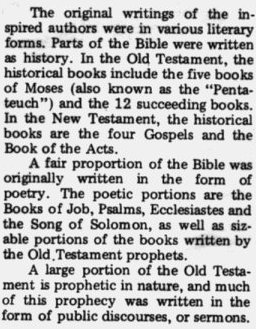
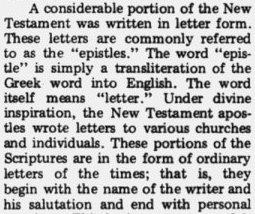
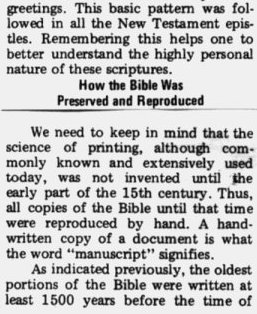
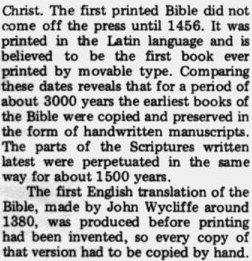
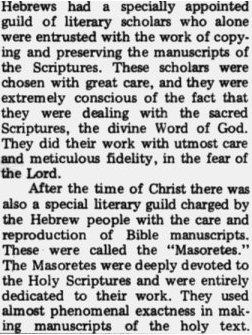


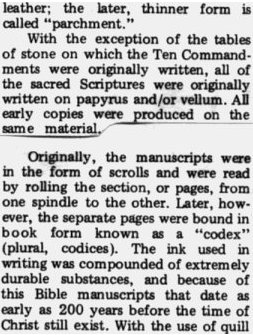
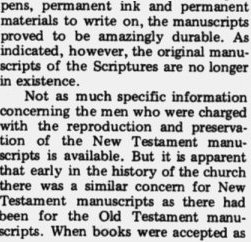

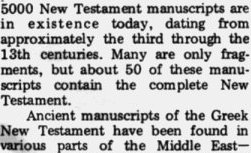

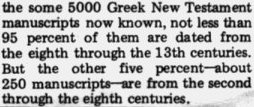
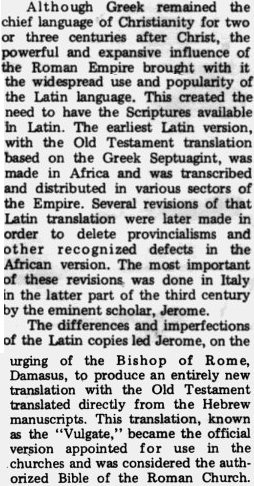
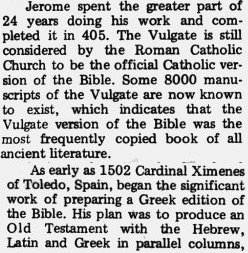
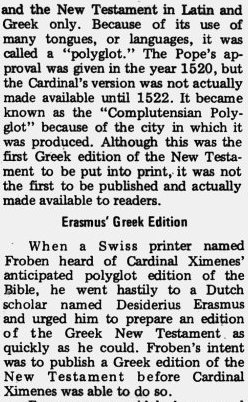
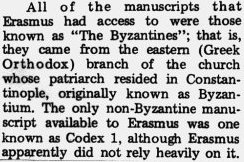
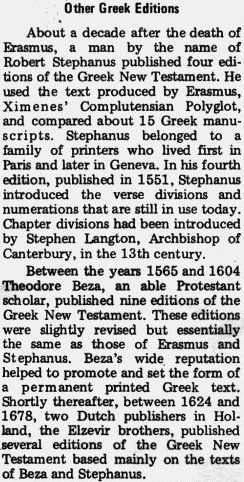
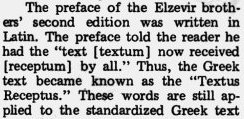
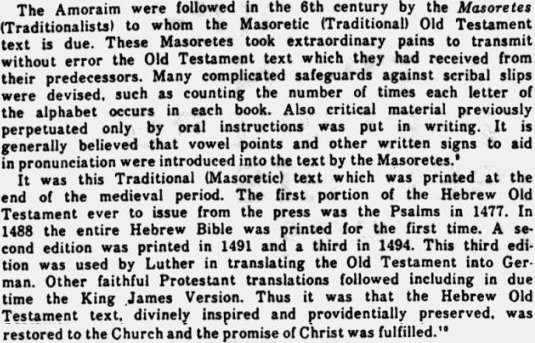
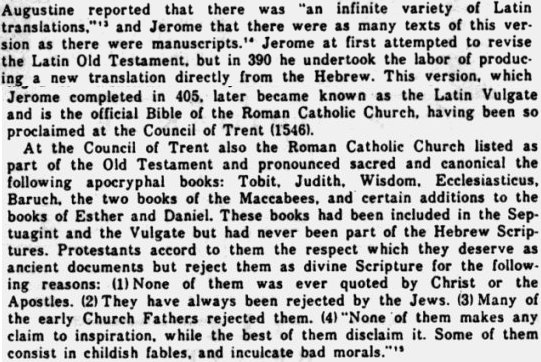
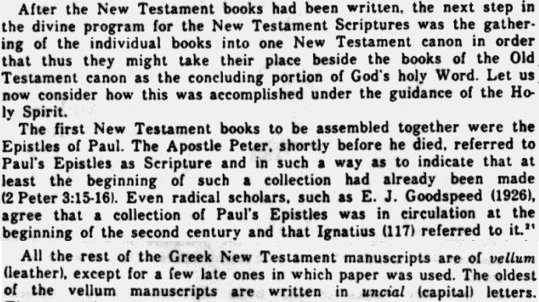
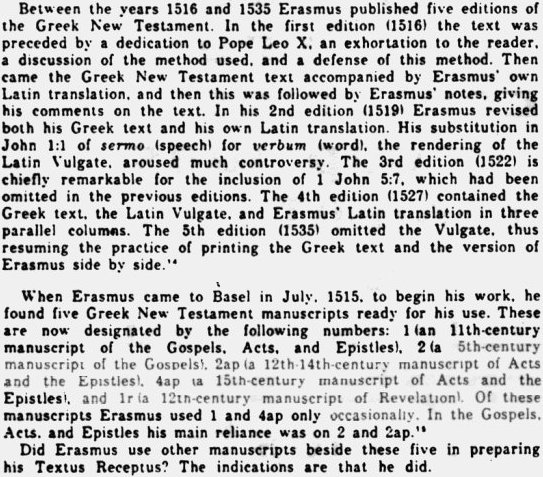

A careful comparison of the exact words of the same verses within various major English versions of what are somewhat-questionably called "Holy Bibles" shows
intolerable differences and confusing discrepancies - not simply of Old-Testament passages:
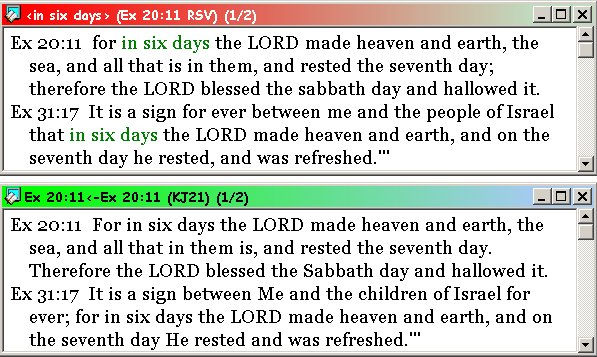
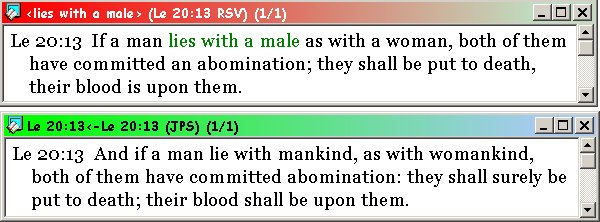

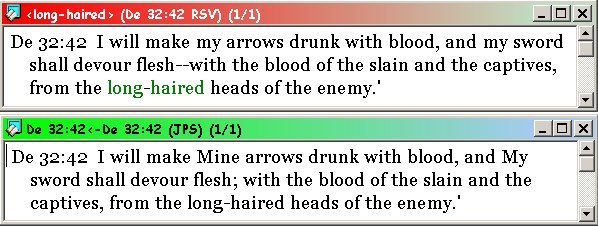
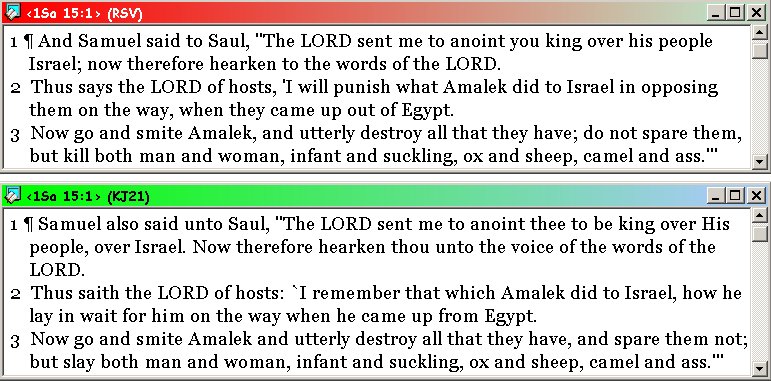
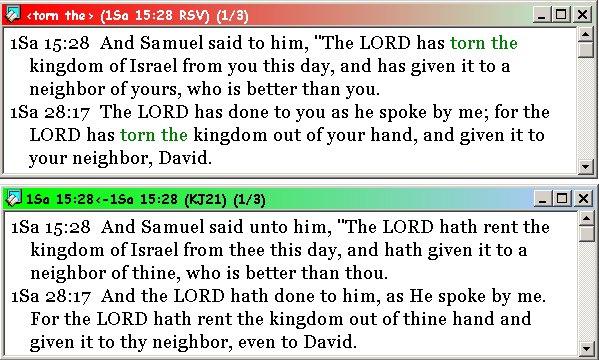
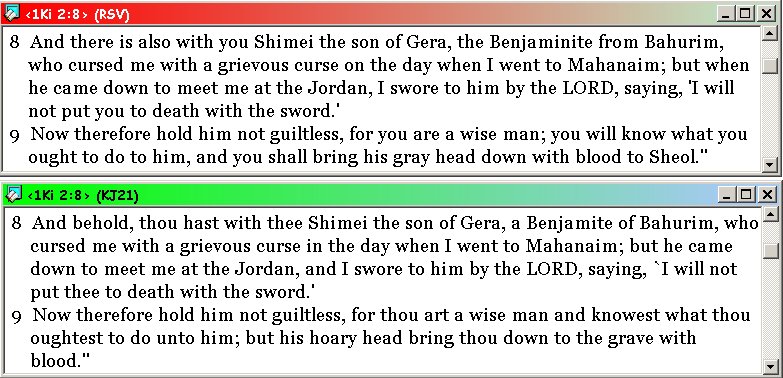

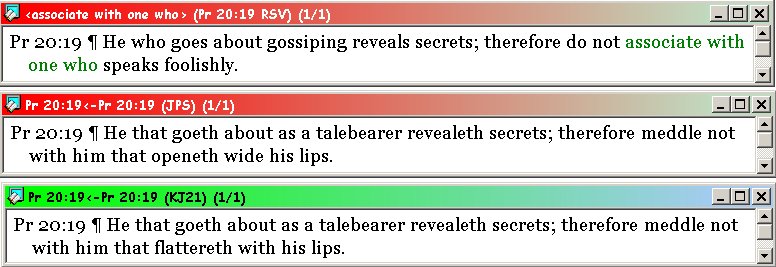


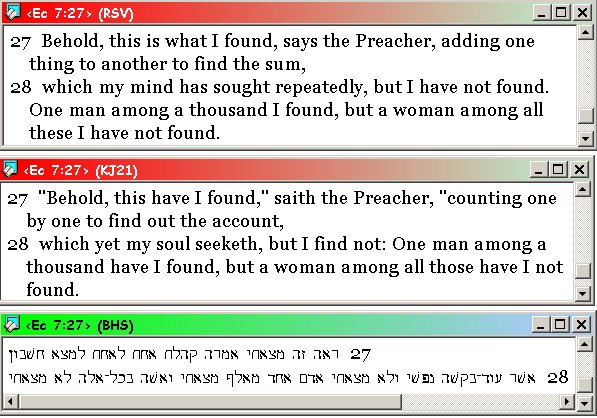
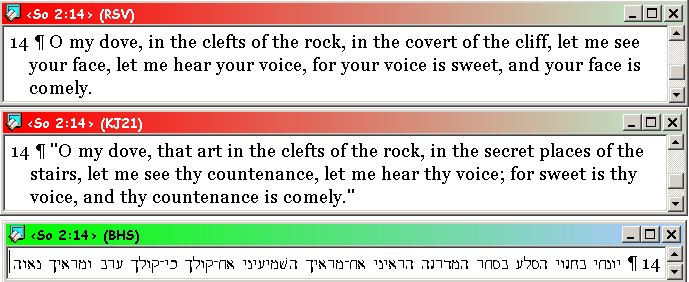
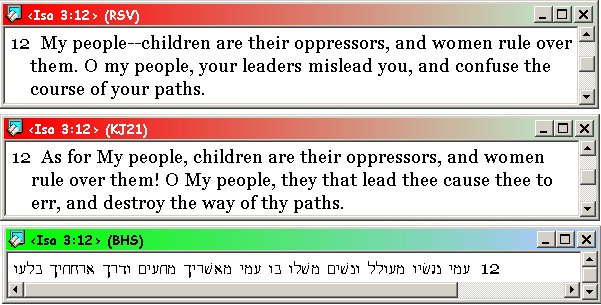
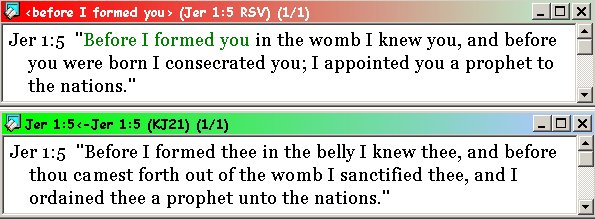
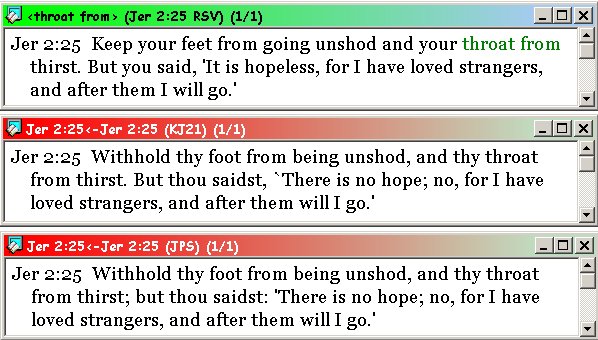
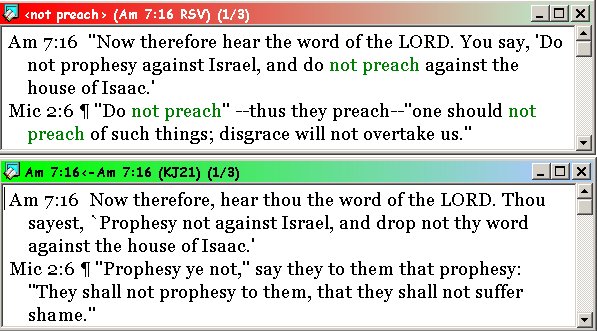
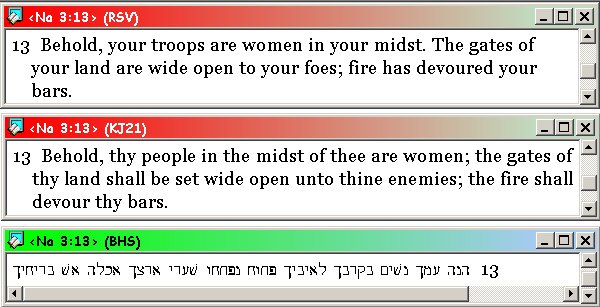
. . . but also intolerable differences and confusing discrepancies of New-Testament passages:
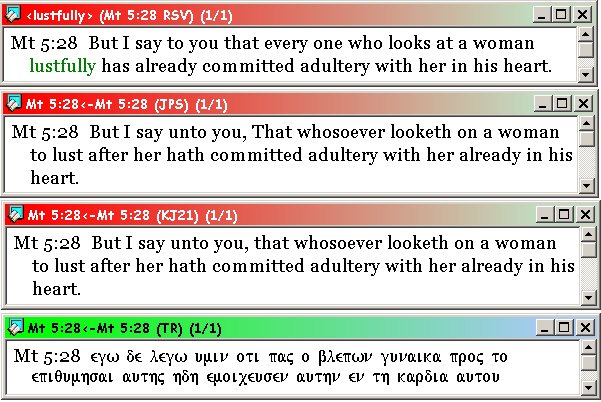
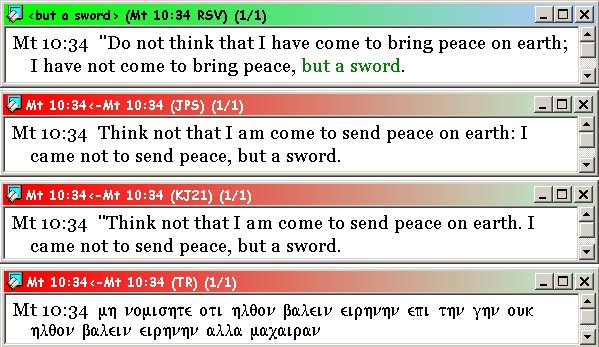
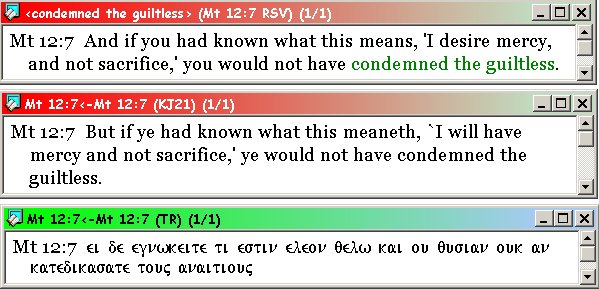
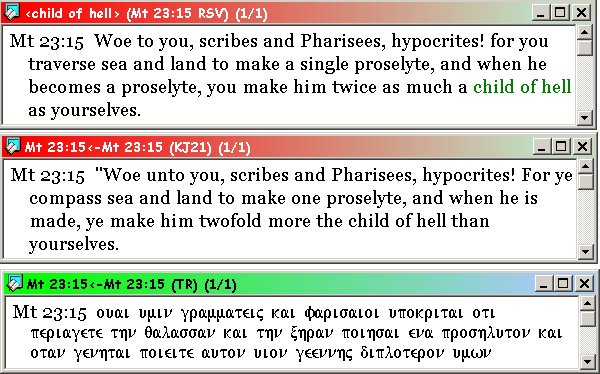
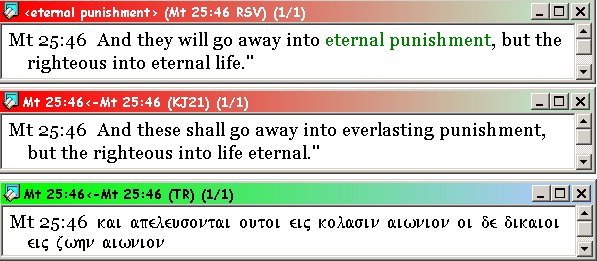
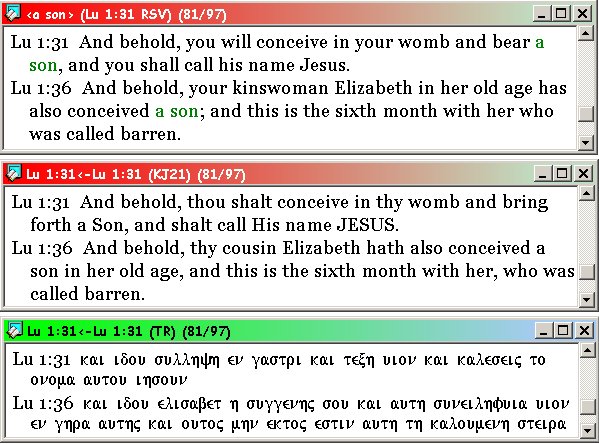
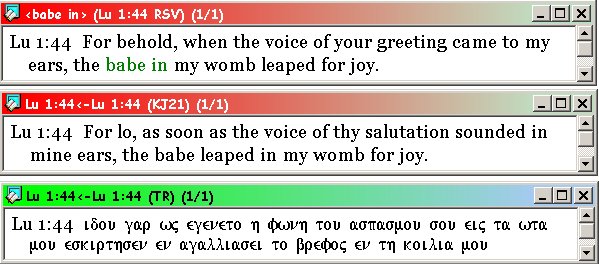
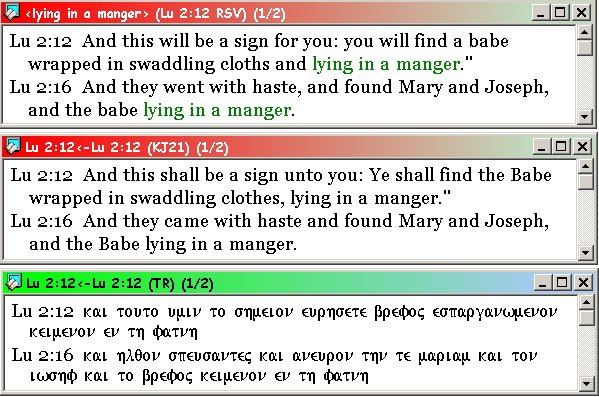
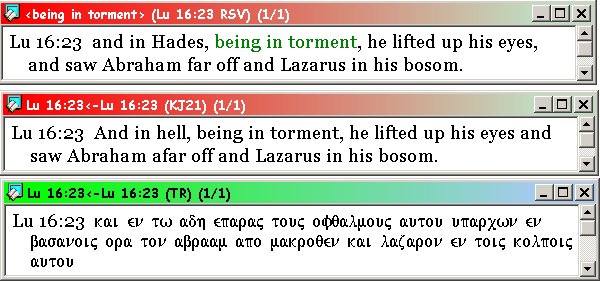
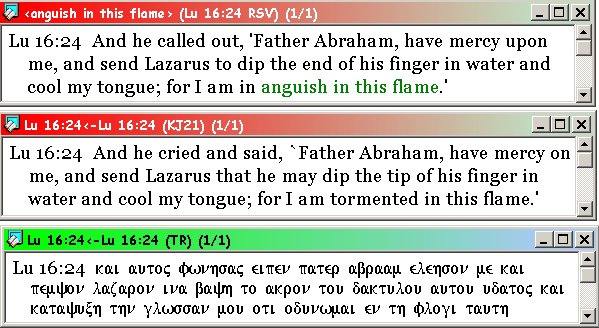
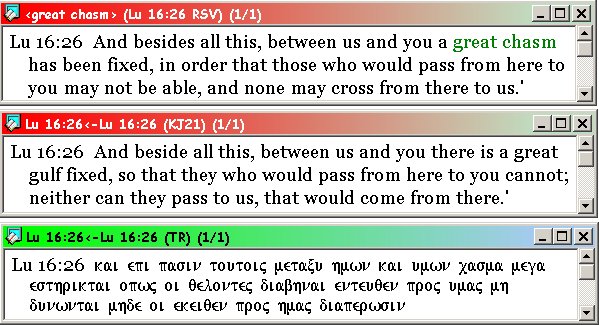
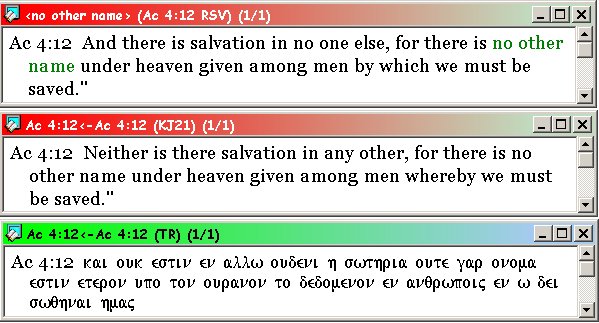
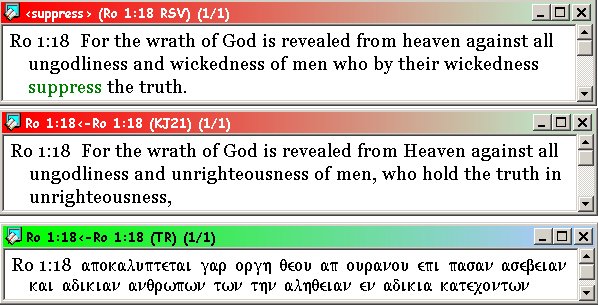
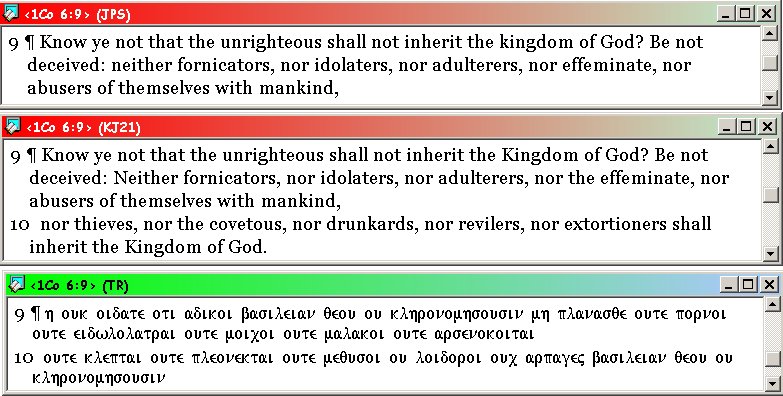
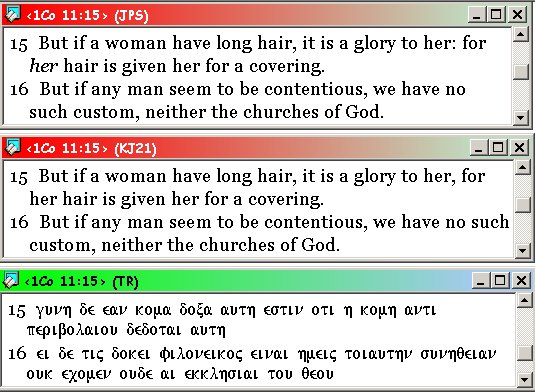
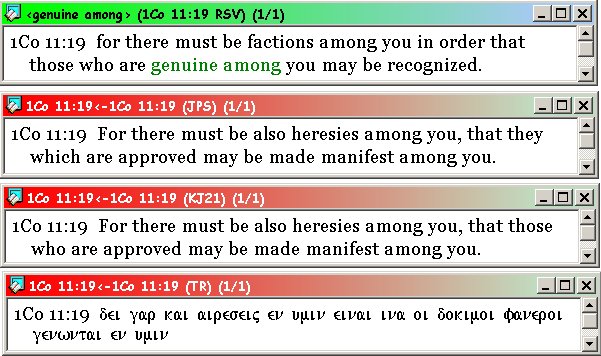
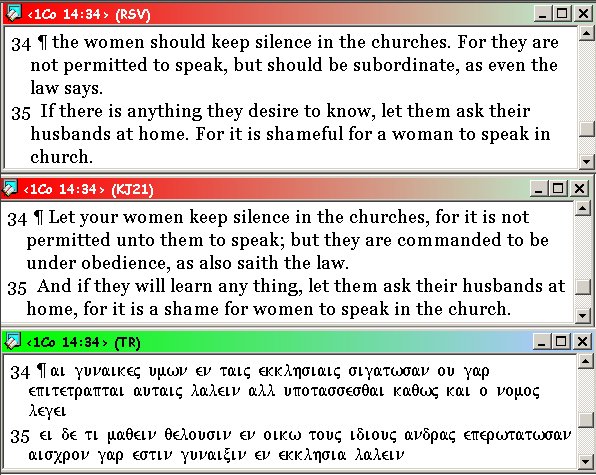
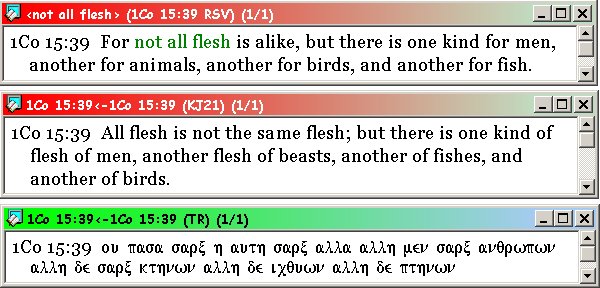
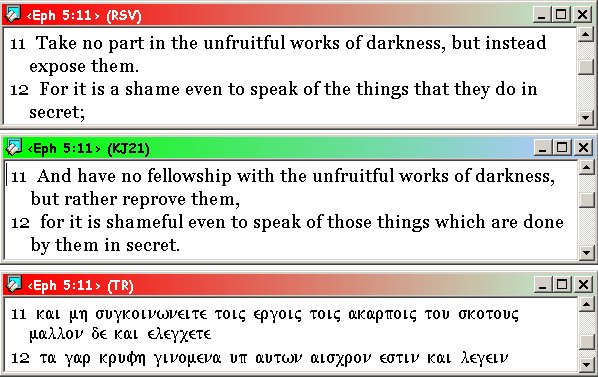
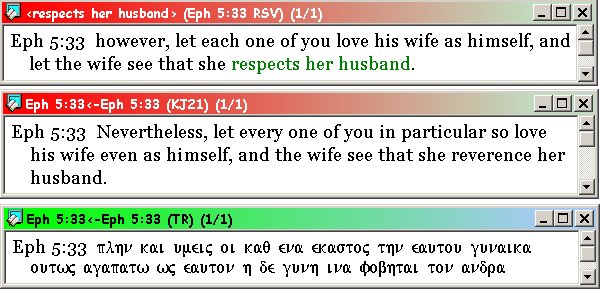
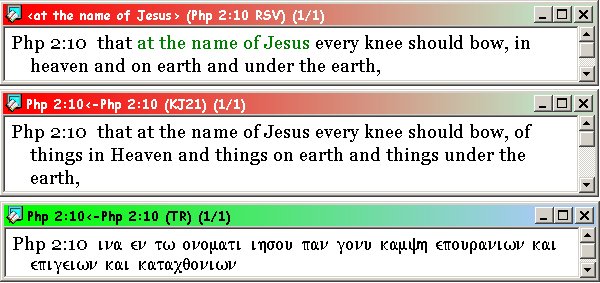
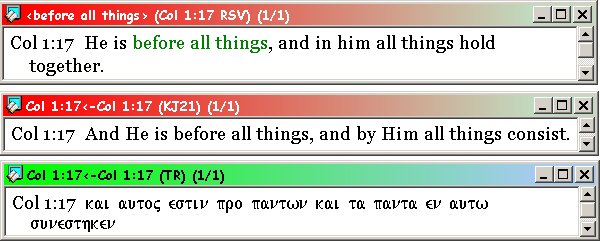
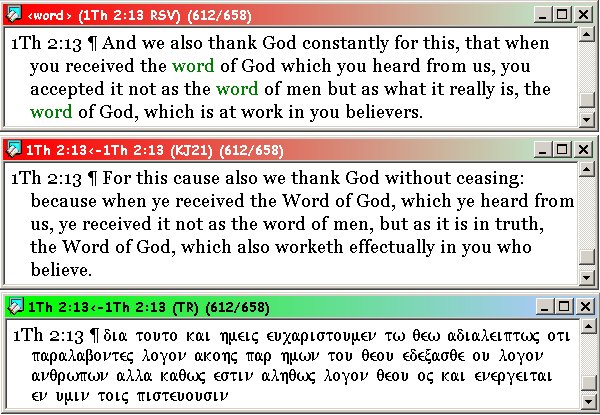
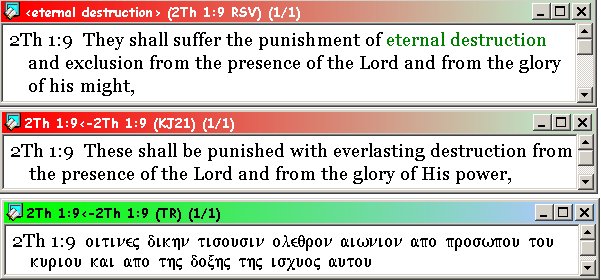
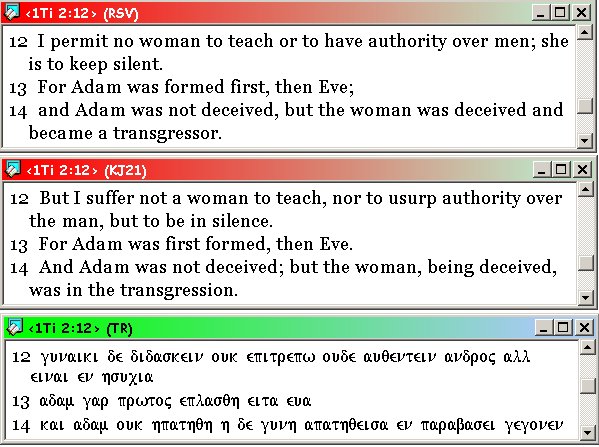
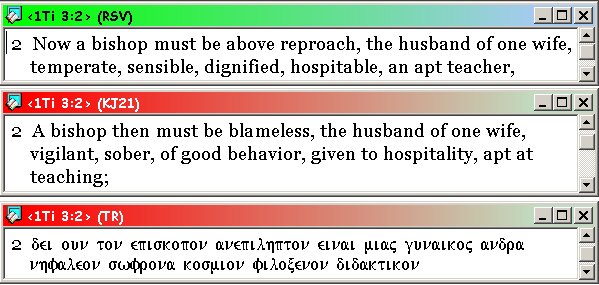
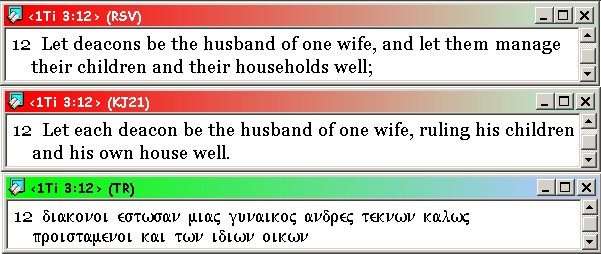
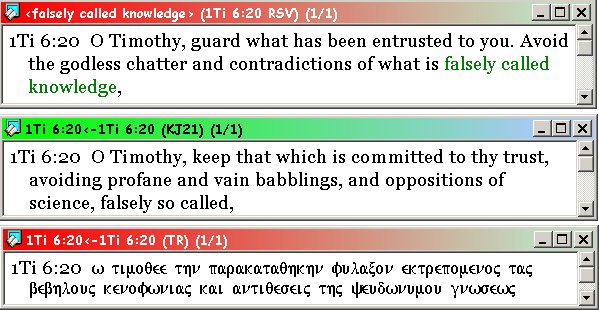
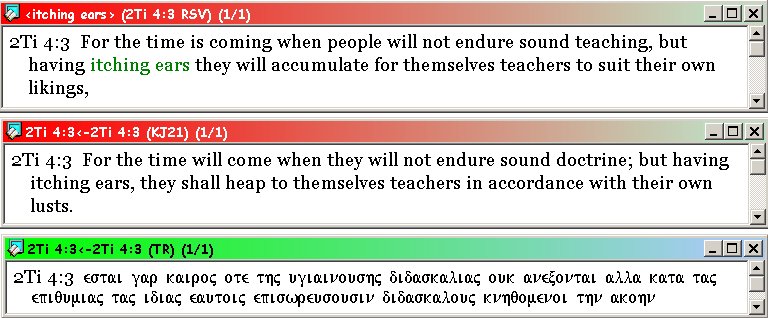
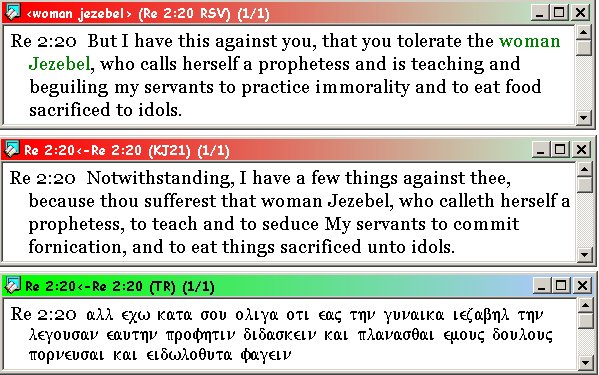
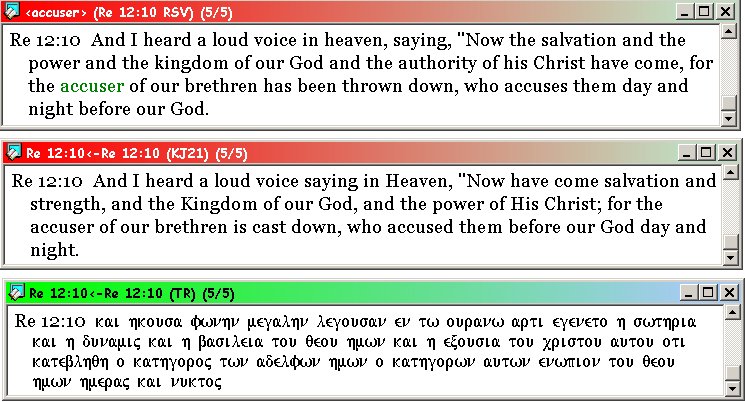
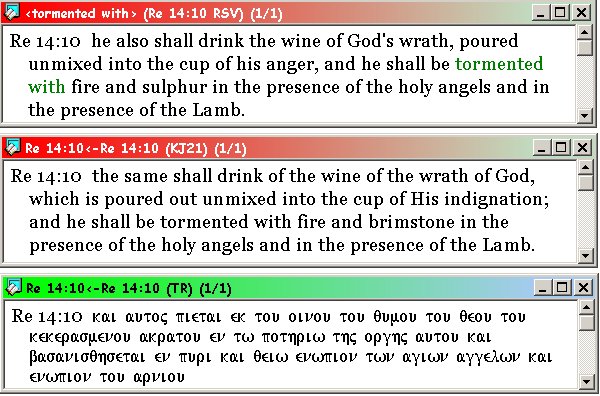

Hypothetically, at any given time during which in-constant-flux-and-change English-language words are employed for from-foreign-languages translation (both pertaining to frequency or infrequency of common usage among the general public, and pertaining to whatever is specifically being described), there is - again - theoretically - ONLY ONE EXACT English word which is BEST applying to whatever that word is being applied to.
Note that the descriptor "theoretically" was stated.
But in fact and obvious practicality, the "theoretical" - for most purposes - never happens, and so no one should be dogmatic when quoting English-language-semantics Bible passages in whatever diverse English Bible translation he or she perfers -- as to purport and allege absolute-assured truth and accuracy regarding what the original authors of the original foreign-language texts (e.g. Hebrew-and-Greek-language) intended.
Those lamentably-differential English-language-wording discrepancies among the diverse Bible translations is exacerbated by the readily-known use of differing Hebrew and especially discrepant foreign-alphabet-lettered Greek-manuscripts used by various English Bible translators and even various editors of such English translations (and mis-translations !).
For example, a VERY small smattering of discrepant-against-each-other New-Testament Greek texts are displayed below.
In the charts, courtesy of http://e-sword.com and portrayed in .jpg file form, the abbreviation GNT-TR+ means: Greek New Testament, Textus Receptus (actually identical to the inerrant Scrivener/Trinitarian Greek Text) with the + sign referring to inclusion of Strong's Identification Numbers for a particular Greek-alphabet-lettered word . . . whereas the abbreviation GNT-WH+ means: Greek New Testament, Westcott-Hort (a couple of London-based occultic heretics who concocted a spurious and corrupt Greek text of/against the New Testament in the 1880s, which significantly-corrupt Greek text is basically what the equally-corrupt Nestle Greek text consists of) with the + sign referring to inclusion of Strong's Identification Numbers for a particular Greek-alphabet-lettered word.
Matthew 9:13
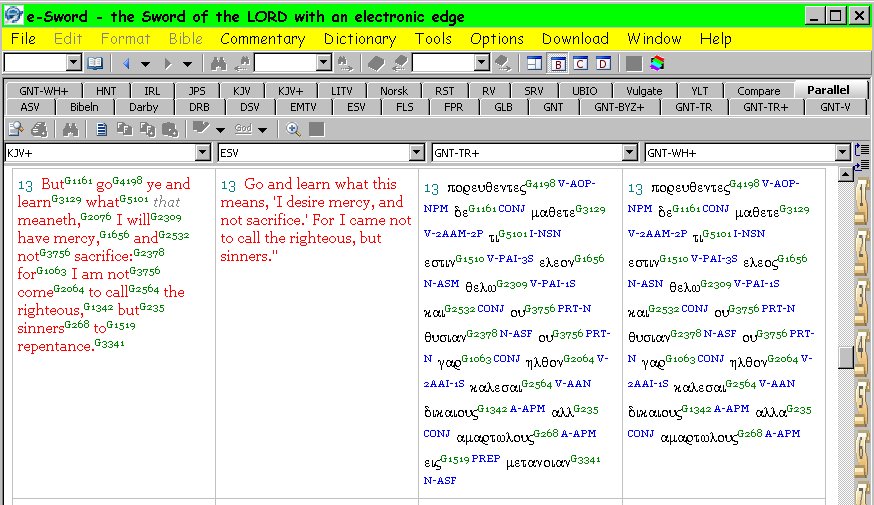
Matthew 16:20
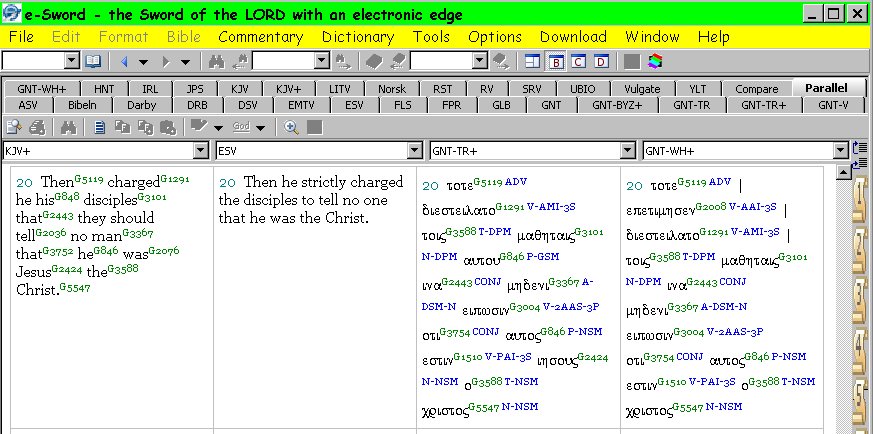
Matthew 17:21
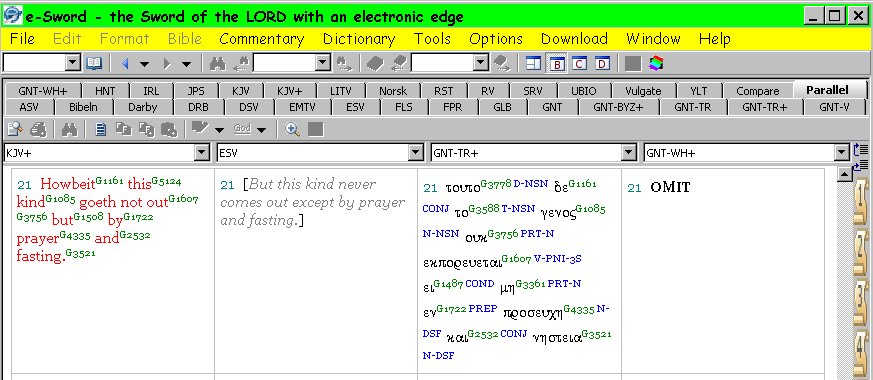
Matthew 18:11
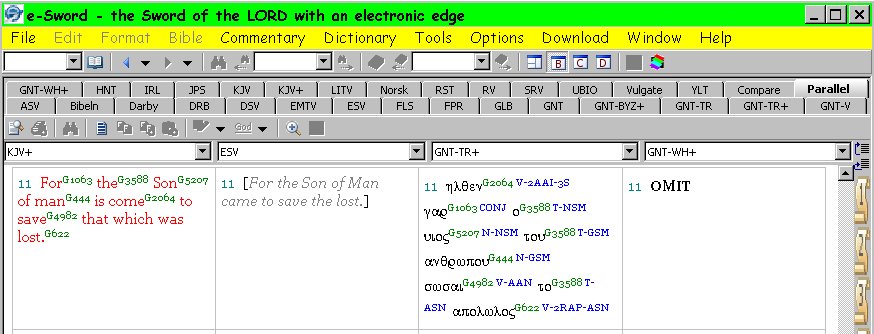
Matthew 20:16
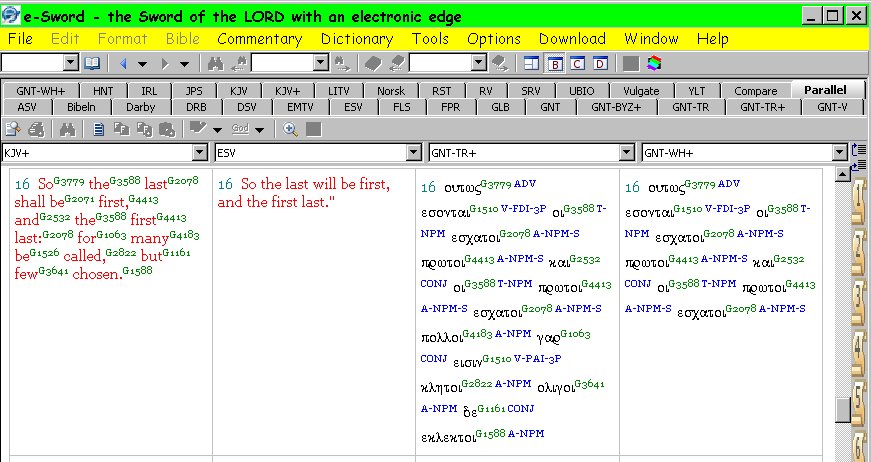
Mark 6:16

Mark 9:29
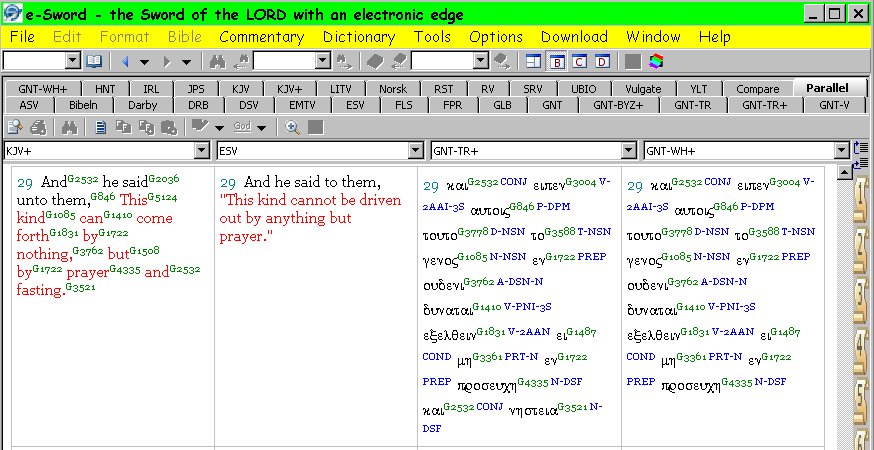
Luke 4:4
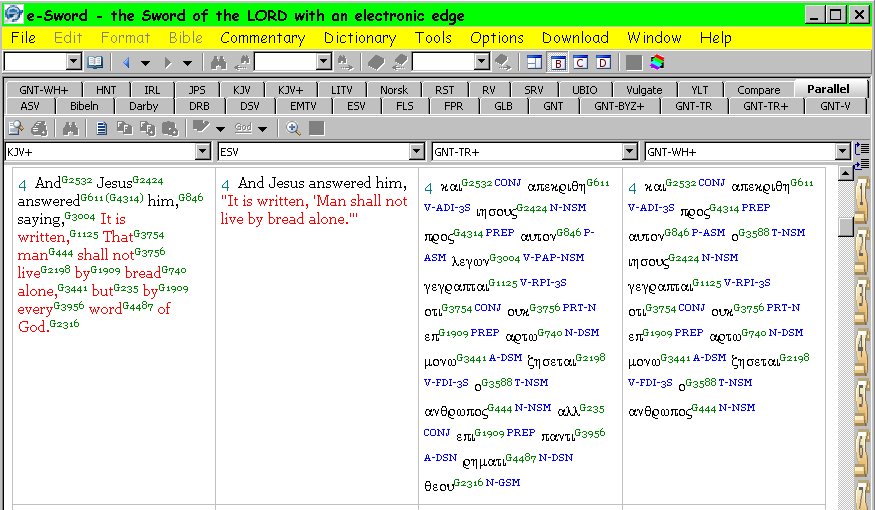
First John 5:7
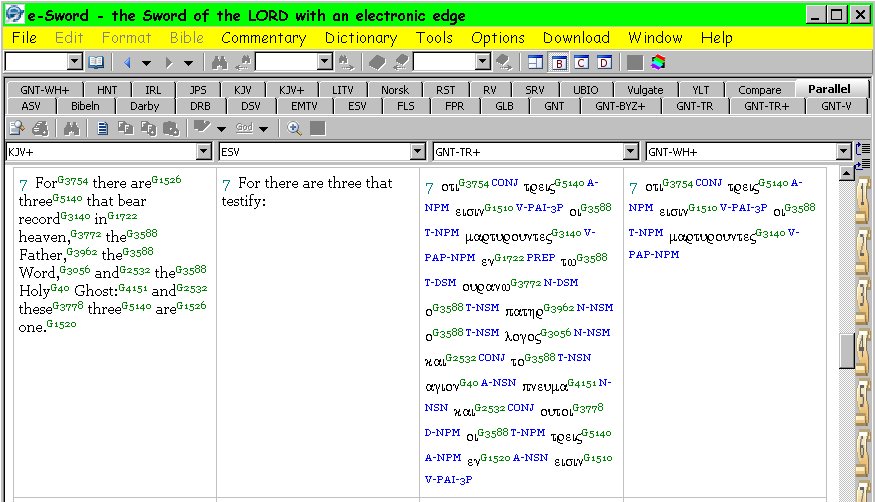
Revelation 21:24
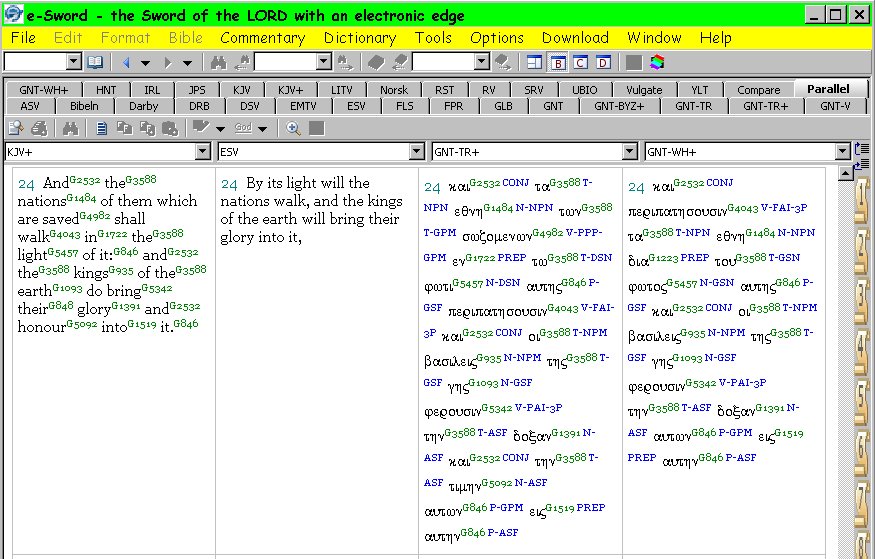
Revelation 22:14

It almost goes without saying, but does not go without saying, that English-worded translations based upon faulty, incomplete, errant, incorrect, wrongly-reworded Greek texts (such as the Westcott-Hort and the Nestle) will of necessity ALSO be faulty, incomplete, errant, incorrect, and wrongly reworded.
Fortunate are we when complete, inerrant, correct Greek Text (note the use of the singular and NOT the plural use of the capitalized word: Text !) is used upon which to base always-in-flux-and-constantly-changing-in-meaning English-lettered words:
First Timothy 5:14
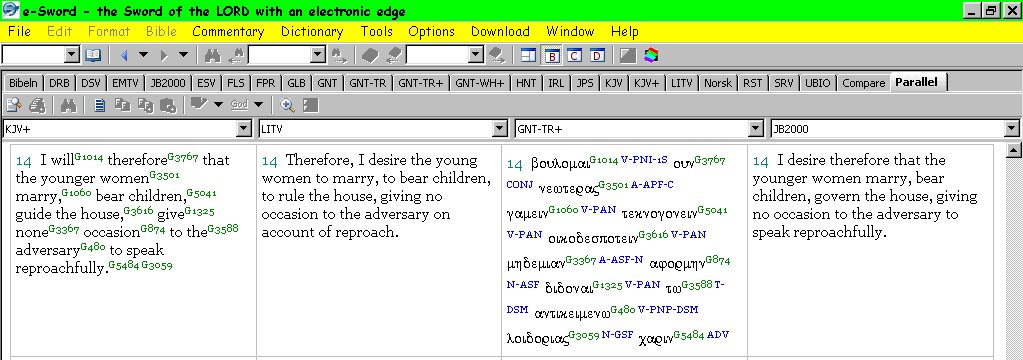
First John 5:7

When the inerrant and infallible ben Asher Masoretic Hebrew Text of the Old Testament is used for as-reliable-as-possible-at-the-time English-word translation (again: singular and not plural !) . . . and when the inerrant and infallible Scrivener/Trinitarian Greek Text of the New Testament is used for as-reliable-as-possible-at-the-time English-word translation (again: singular and not plural !) . . . interlinear English words can be inserted for word-by-word transliteration purposes . . .
. . . as, for instance, regarding various Old-Testament Bible passages:
Numbers 5:18
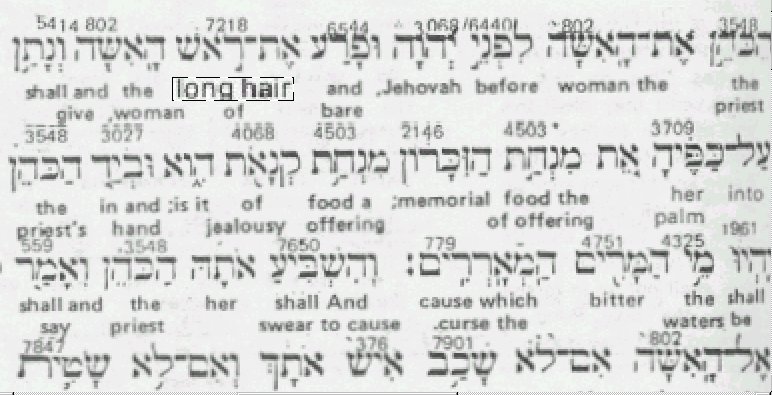
Second Samuel 13:18
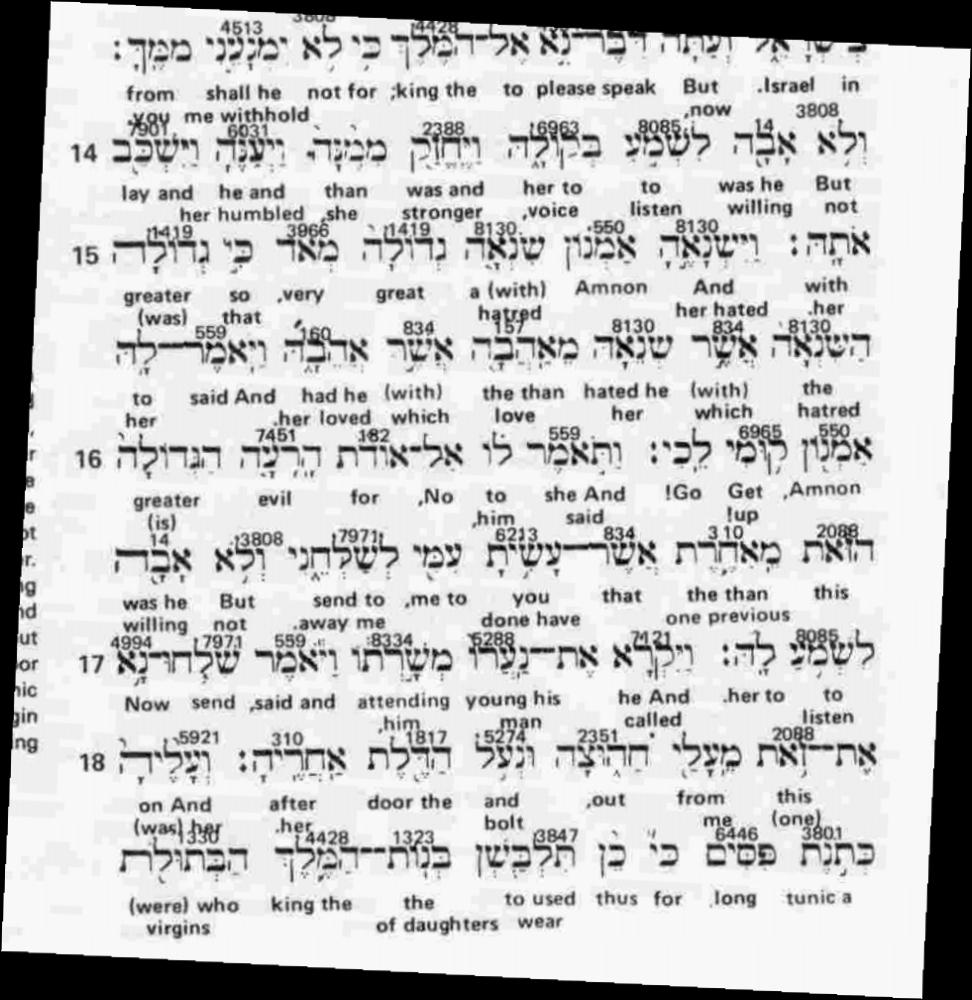
Job 31:1
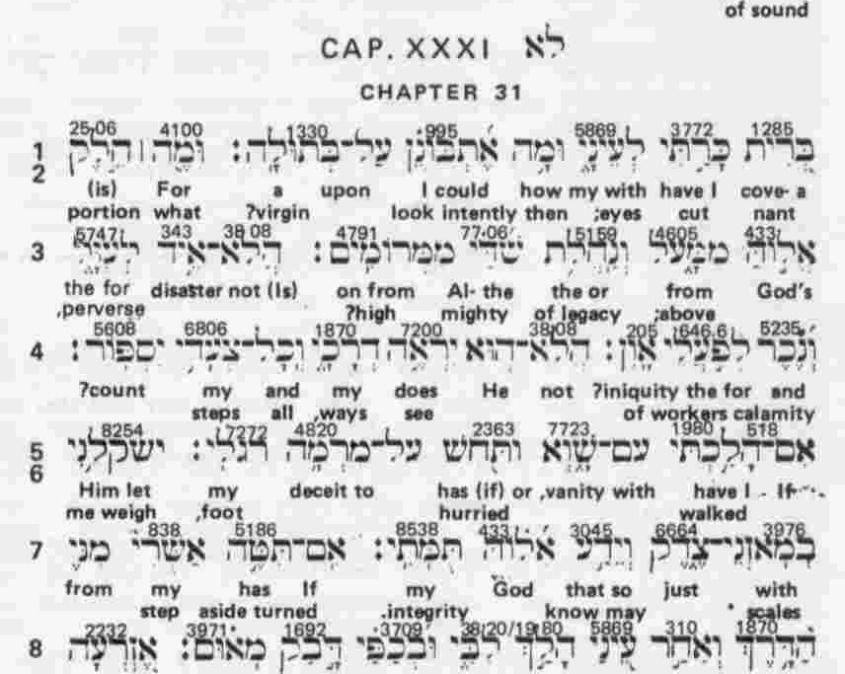
Proverbs 5:19
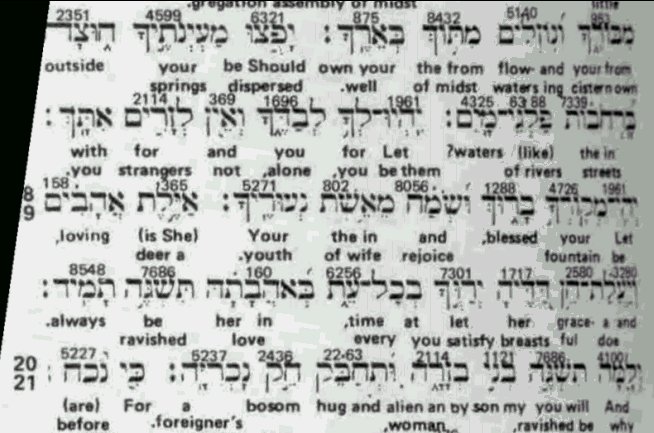
Song 2:14

Song 7:1

Song 7:5
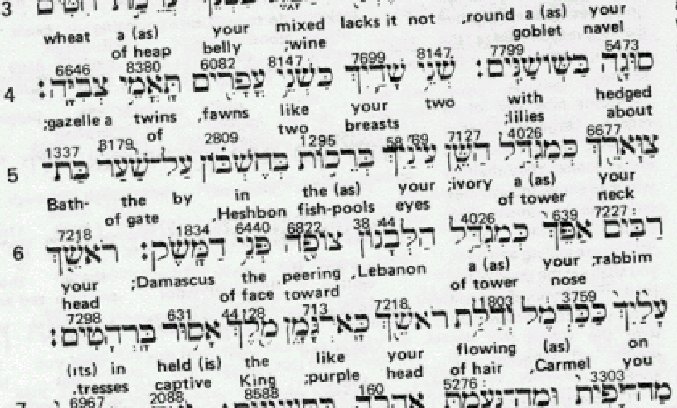
[ EDITOR'S NOTE: Observe that the writer is referring to the "flowing locks" loose long hair of his own bride and not some random publicly-observable human female who does not presently belong to him in marriage ]
Isaiah 20:4
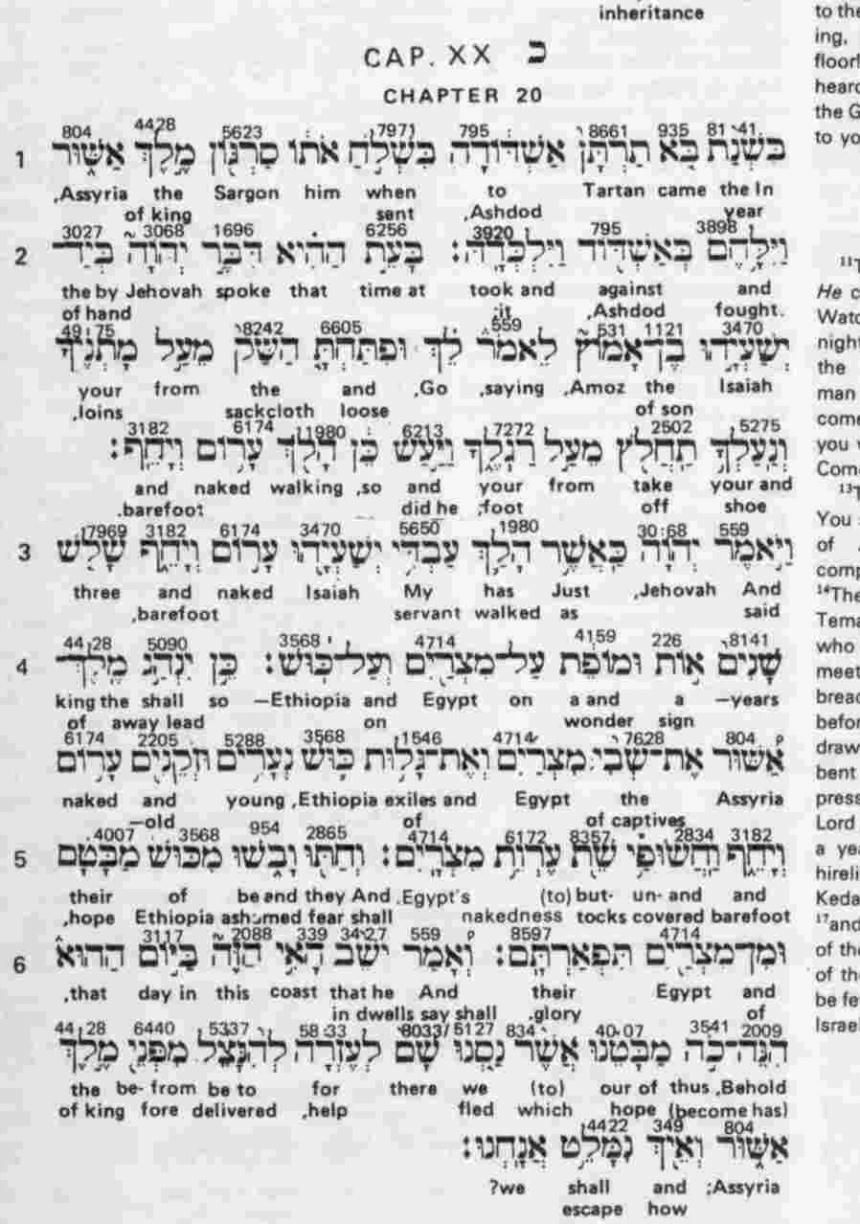
Isaiah 47:2
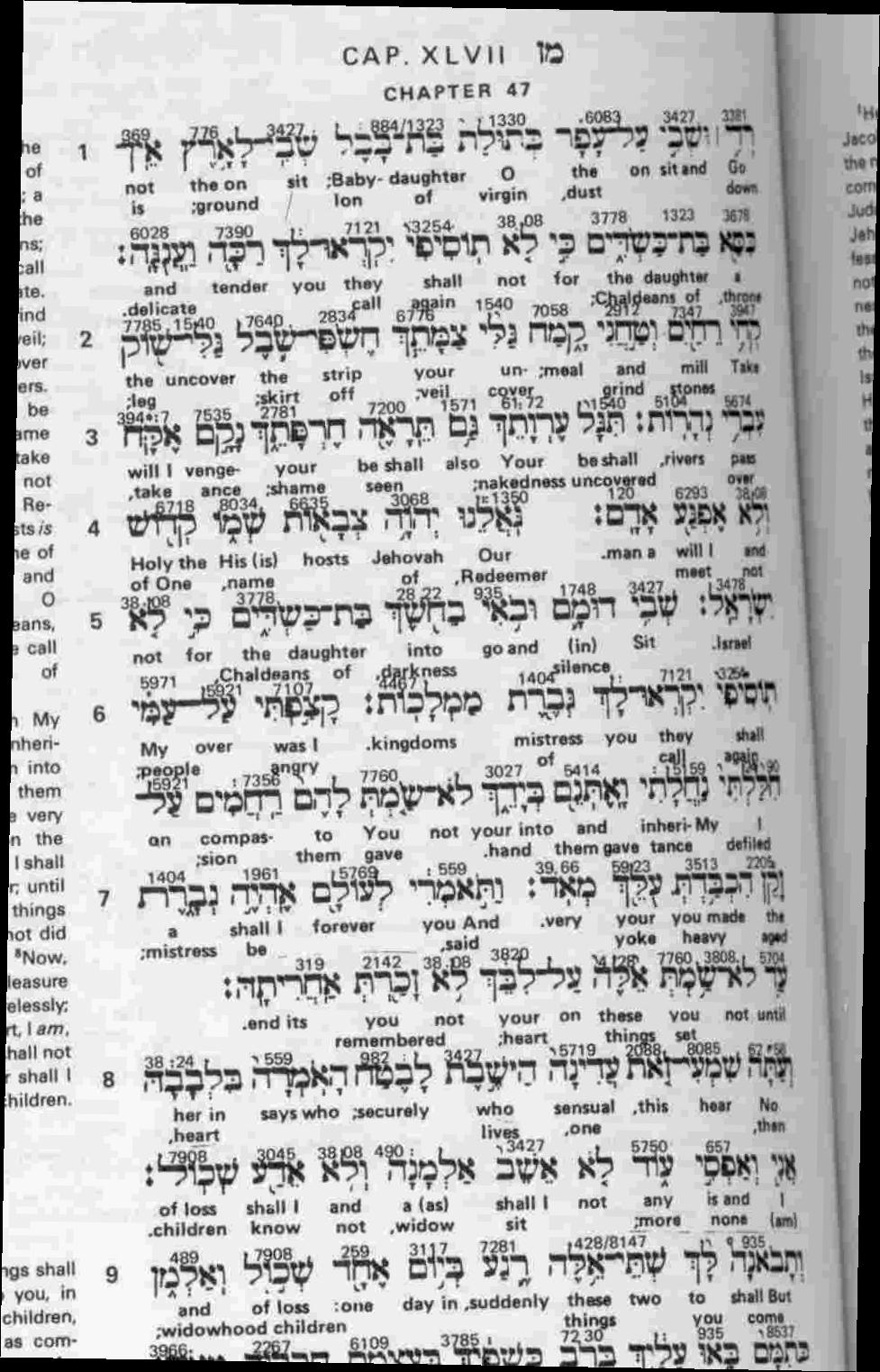
[ EDITOR's NOTE: The non-pervert writer is either commanding some foreign woman to degrade herself by sitting in the dust on the ground and shame herself by stripping off her leg covering so as to expose the nakedness of her legs, and/or is sarcastically telling her to go ahead and degrade herself with immodest display which she intended to do anyway by her own choice -- all as commanded by the authority of the God of Israel, but who is a Redeemer to those clothed-and-in-their-right-mind penitent who have previously defiled themselves by being lewd-and-lascivious legs-baring exhibitionists ]
Jeremiah 2:25
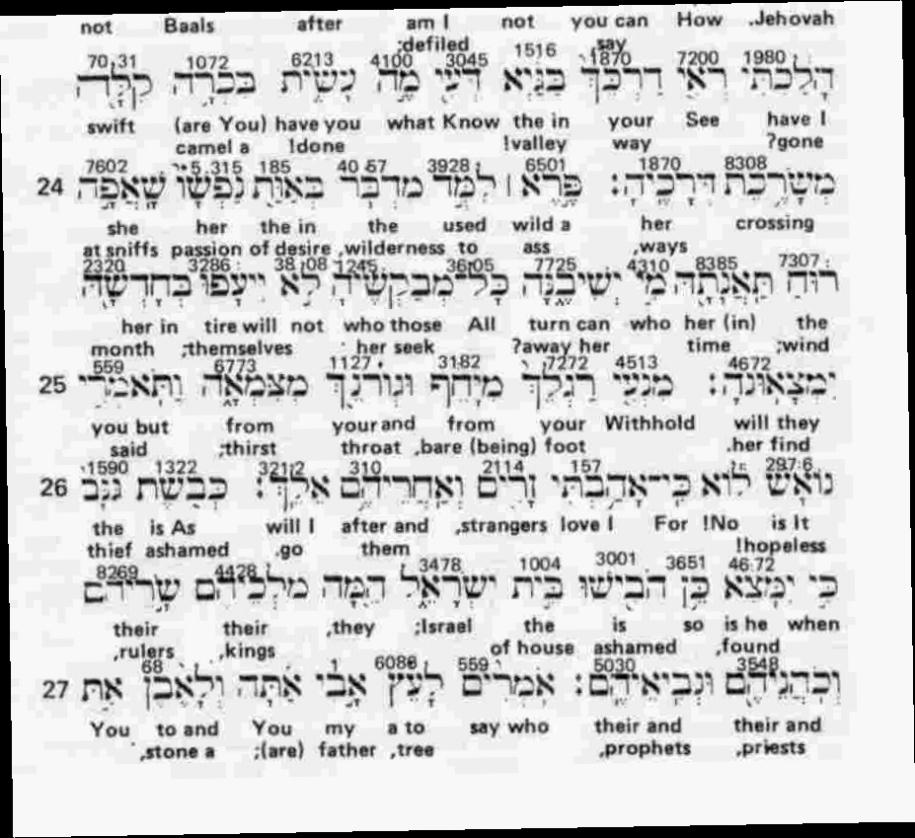
. . . and regarding various New-Testament Bible passages:
Greek/English Interlinear-Bible Verses
The following are selected
Greek/English Interlinear-Bible verses
of the New Testament
First Corinthians 6:9-10
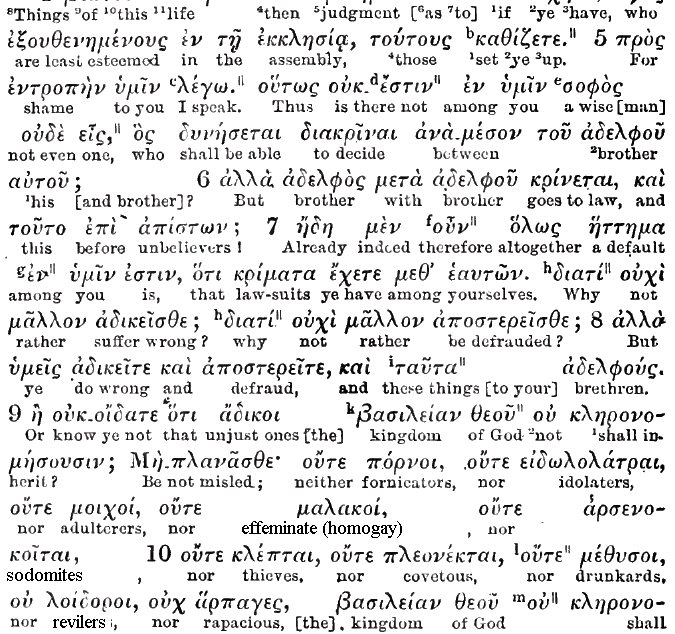
First Corinthians 6:15
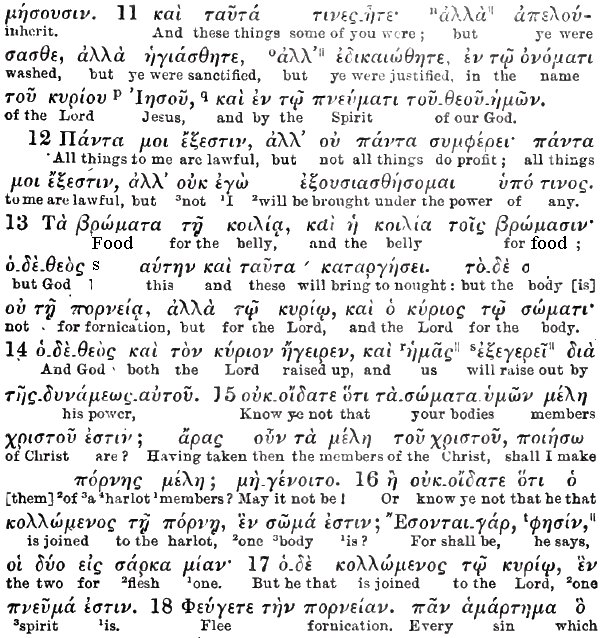
First Corinthians 7:1
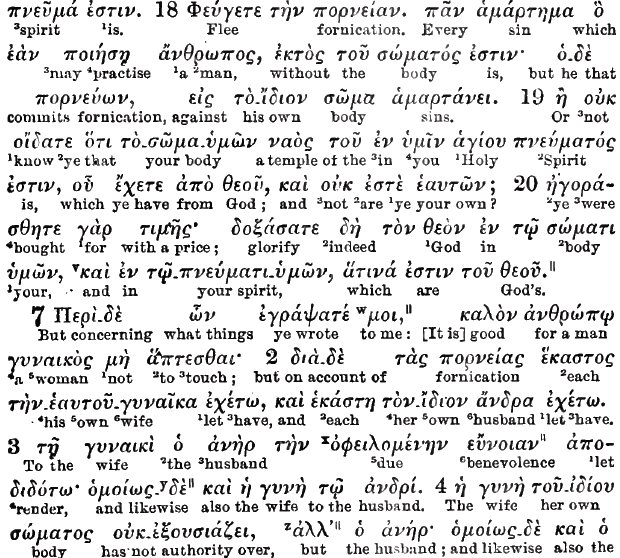
First Corinthians 7:5
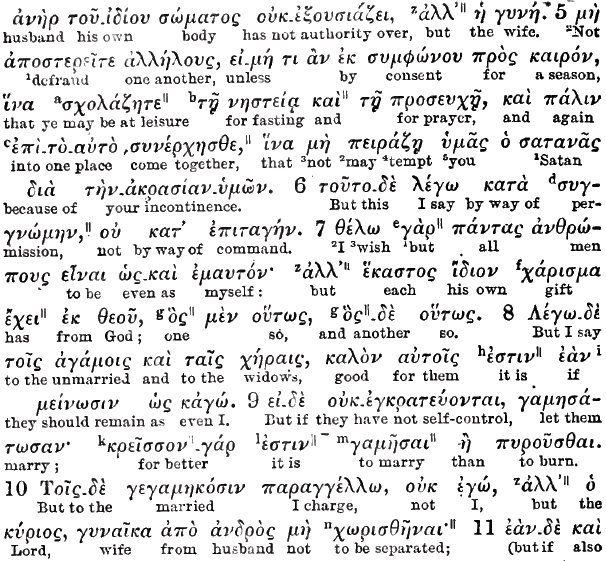
First Timothy 1:10
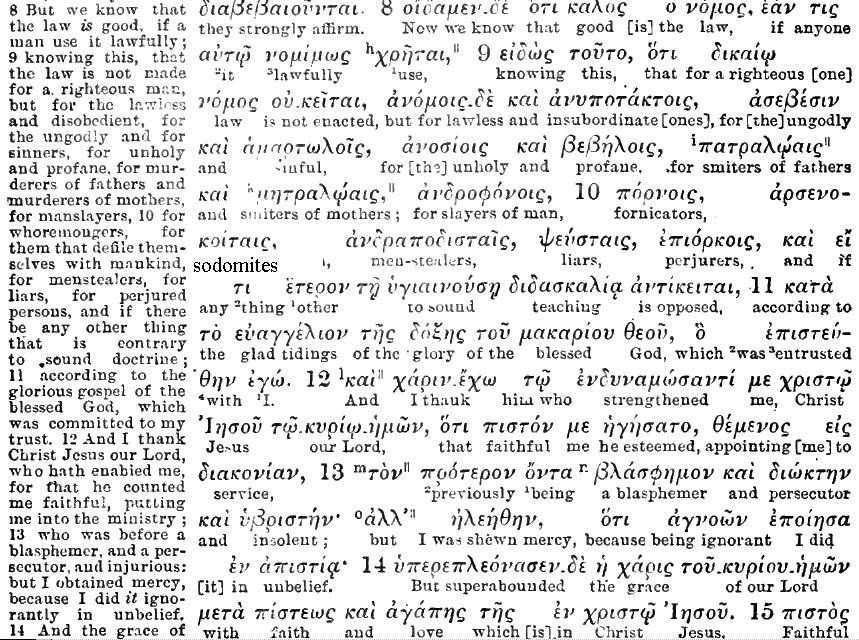
First Timothy 2:9
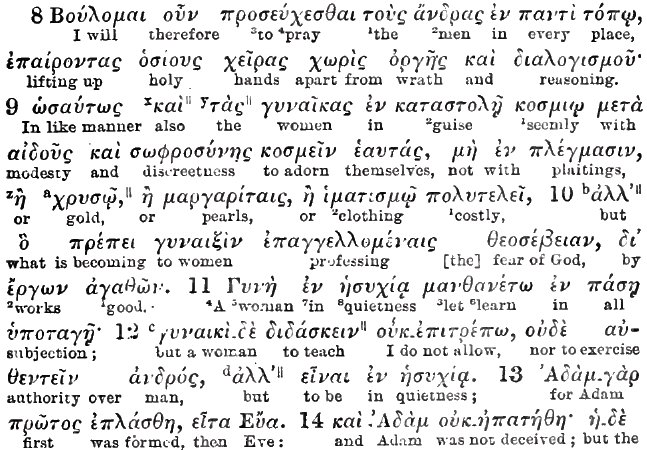
First Timothy 2:15
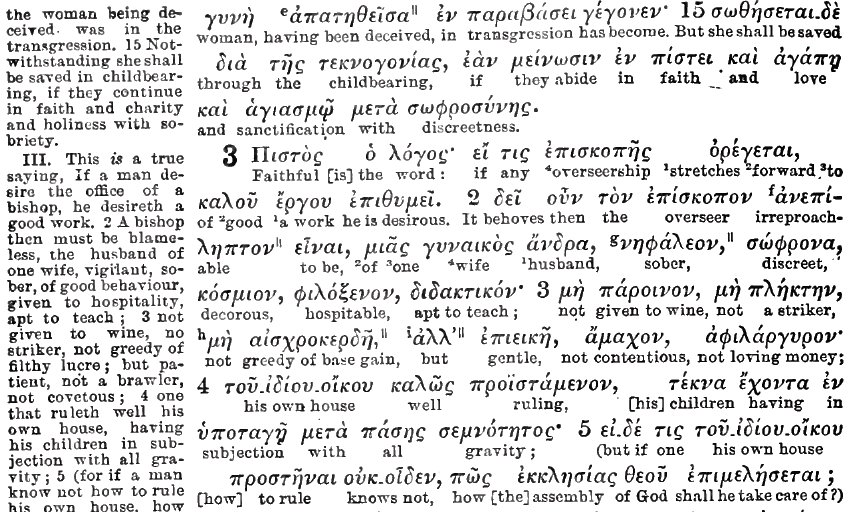
First Timothy 5:2
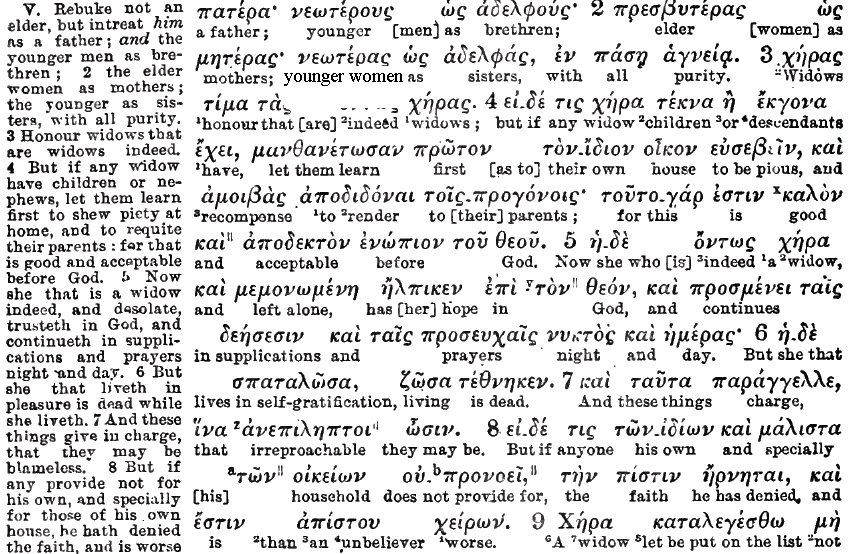
First Timothy 5:14

First John 1:1
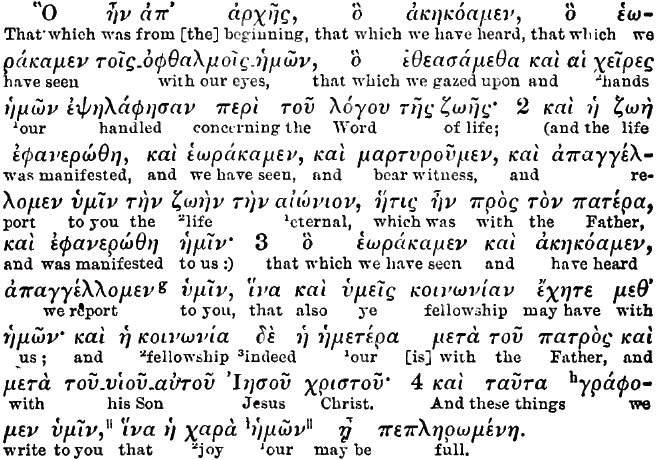
First John 5:7
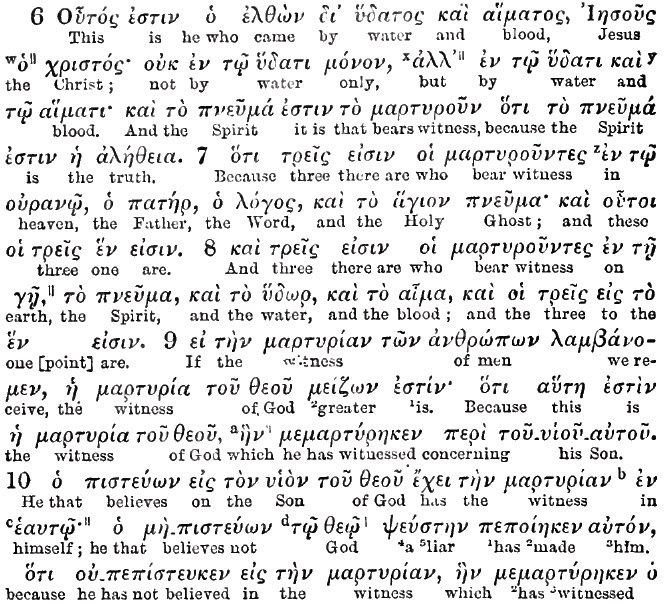
In summary, regarding (and concerning!) all languages (whether English or foreign-to-us ones) describing phenomena within our environment which we have perceived and perhaps yet perceive, the selection and application of certain and whatever words to certain differentiated phenomena might become confusing or questionable not merely because of us but especially because of others, which the many who are divisive subversives will capitalize on and take advantage of to every one's detriment:
Second Timothy 2:14 Remind them of this, and charge them before the Lord to avoid disputing about words, which does no good, but only ruins the hearers.
All God-fearing and God-loving people everywhere at any time (including those yet-alive who have not foolishly destroyed themselves by not adjusting nor accommodating to reality around them) can agree that there definitely are absolutes created by God the Creator through Jesus Christ:
Colossians 1:15 He [Jesus Christ] is the image of the invisible God, the first-born of all creation;
Colossians 1:16 for in Him all things were created, in heaven and on earth, visible and invisible, whether thrones or dominions or principalities or authorities -- all things were created through Him and for Him.
Colossians 1:17 He is before all things, and in Him all things hold together.
Beginning-and-ending perceived and measurable absolutes in our physical environment do in fact obviously exist:
Job 38:4 Where were you when I laid the foundation of the earth? Tell me, if you have understanding.
Job 38:5 Who determined its measurements -- surely you know! Or who stretched the line upon it?
Job 38:8 Or who shut in the sea with doors, when it burst forth from the womb;
Job 38:9 when I made clouds its garment, and thick darkness its swaddling band,
Job 38:11 and said, 'Thus far shall you come, and no farther, and here shall your proud waves be stayed?'
And yet, even though there indeed are absolutes, it is difficult if not impossible for us finite and limited human creatures to specifically detect, determine, precisely measure, and then declare where and when one object within the environment precisely ends and the other begins.
When we touch a wall, a table, a rock, an animal, another person, whatever . . . where exactly do the molecules and atoms of our hand precisely contact the object and are stopped from proceeding further by the molecules and atoms of the other object?
That imprecision and incapacity to exactly determine beginnings and endings was described by Solomon:
Ecclesiastes 3:11 He has made everything beautiful in its time; also He has put eternity into man's mind, yet so that he cannot find out what God has done from the beginning to the end.
But, regarding selection and use of proper words (or properly-applied words) as descriptors, neither the commoner nor the scholar is left in hopeless confusion and paralyzed catatonic stupor concerning which words to use for what.
There are three resources useful for us humans to discern which words to apply for what:
(1) Our innate rationality and logic relating to utilization of our five or more physical senses.
(2) The discernment and enlightenment of scholars who, by the exhibited good and admirable fruits of their lives, are believed and trusted as dependable and reliable.
(3) The Spirit of God enlightening each individual personally in accord with Acts of God not merely determining "what is real" but enforcing the existence, sovereignty, and immutability of what is real.
Regarding (1) above:
Luke 1:1 Inasmuch as many have undertaken to compile a narrative of the things which have been accomplished among us,
Luke 1:2 just as they were delivered to us by those who from the beginning were eyewitnesses and ministers of the word,
Luke 1:3 it seemed good to me also, having followed all things closely for some time past, to write an orderly account for you, most excellent Theophilus,
Luke 1:4 that you may know the truth concerning the things of which you have been informed.
Second Peter 1:16 For we did not follow cleverly devised myths when we made known to you the power and coming of our Lord Jesus Christ, but we were eyewitnesses of His majesty.
First John 1:1 That which was from the beginning, which we have heard, which we have seen with our eyes, which we have looked upon and touched with our hands, concerning the word of life . . .
First John 1:2 the life was made manifest, and we saw it, and testify to it, and proclaim to you the eternal life which was with the Father and was made manifest to us . . .
First John 1:3 that which we have seen and heard we proclaim also to you, so that you may have fellowship with us; and our fellowship is with the Father and with his Son Jesus Christ.
Not only that, but it can be agreed (among the truthfully-honest and non-insane) that an orange is not an elephant - even though both are lifeforms. One cannot have it both ways at the same time.
"Green" is not "red" - even though both are colors. One cannot have it both ways at the same time.
All young "widows" are young "women," but not all young "women" are young "widows" - even though both are female human beings (see KJV's translation of First Timothy 5:14 in contrast to certain other "bible" versions). One cannot have it both ways at the same time.
A "multi-colored" robe is not the same as a "long-sleeved full-length" robe - even though both are robes (see RSV's and NASV's translation of Second Samuel 13:18 compared to that of the KJV, NIV, etc.). One cannot have it both ways at the same time.
"Hair" (of the head) is not the same as "loose-long-haired flowing locks" - even though both are human hair (see RSV's and NASV's translation of Numbers 5:18 and Song of Solomon 7:5 in stark contrast to that of the KJV, NIV, etc.). One cannot have it both ways at the same time.
And, more often than not, what seems to be "nitpicky, incidental, trifling," or "inconsequential" "slight" differences to the damnably deceitful, devious and demented are instead in fact crucial and vital differences pertaining to important major doctrines and the jealously-enforced (frequently-lethal-against-the-defiant) intentions of the Holy Spirit of God though the Lord Jesus Christ.
Second Corinthians 4:2 We have renounced disgraceful, underhanded ways; we refuse to practice cunning or to tamper against God's word, but by the open statement of the truth we would commend ourselves to every man's conscience in the sight of God.
Regarding (2) above:
The "opinions" of the apostates of the church of Alexandria, when at odds against the saints of the church of Antioch, are not trustworthy, and those of saint Cyrian can be trusted rather than those of heretic Marcion, and trustworthy are those of Erasmus and Luther and Elzevir and Beza and Stephens and Scrivener rather than those of Westcott and Hort or Nestle or whoever touts and promotes non-inerrant Greek texts and manuscripts particularly relating to the New Testament of the actual Holy Bible.
One cannot have it both ways at the same time -- when it is plain that "apples are not oranges" and "oranges are not apples."













































































































